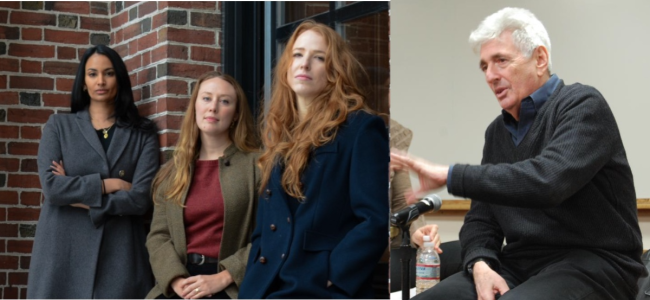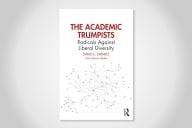You have /5 articles left.
Sign up for a free account or log in.

From left: Amulya Mandava, Lilia Kilburn, Margaret Czerwienski and John Comaroff
Lena Warnke Photography (left)
Three graduate students sued Harvard University on Tuesday, alleging that the institution continually downplayed or ignored complaints about sexual misconduct by John Comaroff, Hugh K. Foster Professor of African and African American Studies and of Anthropology.
Harvard’s anthropology department has faced multiple faculty sexual misconduct scandals in recent years, including one that led to Harvard relieving longtime professor Gary Urton of his emeritus status and banning him from campus. (Urton apologized for sending a student an inappropriate email but has not addressed the other, more serious allegations against him beyond saying, "I do not feel the sanctions against me are fair or just.") This new lawsuit sheds more light on the ongoing allegations against Comaroff, who is on administrative leave this semester for violating Harvard’s antiharassment and professional conduct policies—and who continues to vehemently deny any wrongdoing.
‘Asymmetry of Information,’ and of Power
Previously, Harvard told its anthropology and African and American studies departments that Comaroff was found to have engaged in “verbal conduct” that violated community norms. Comaroff has maintained that travel advice he gave to a female graduate student was misconstrued, and that Harvard violated his due process rights during its investigation.
Some 38 Harvard professors signed a public letter of concern about how the university has treated their colleague, saying, “We the undersigned know John Comaroff to be an excellent colleague, advisor and committed university citizen who has for five decades trained and advised hundreds of Ph.D. students of diverse backgrounds, who have subsequently become leaders in universities across the world. We are dismayed by Harvard’s sanctions against him and concerned about its effects on our ability to advise our own students.”
Claudine Gay, Edgerley Family Dean of Harvard’s Faculty of Arts and Sciences, responded to the letter with one of her own, warning Comaroff’s supporters against the “obvious dangers of an asymmetry of information in a situation like this. If you have not reviewed the full findings of an investigation, it is hard to assess the proportionality of the response.”
Gay wrote it would “not be appropriate for me to provide specifics of Prof. Comaroff’s behavior." Yet she clearly suggests that there’s more to the story. The lawsuit filed Tuesday presumably tells that story, from the point of view of Comaroff’s accusers.
More to the Story?
The plaintiffs in the case are Margaret Czerwienski, Lilia Kilburn and Amulya Mandava, all of whom are graduate students in anthropology at Harvard. They say that Harvard has protected Comaroff since before it hired him, as it was aware of Comaroff’s reputation as a “predator” and “groomer” at the University of Chicago, where he worked from 1979 to 2012, yet “welcomed him anyway.”
The result was “predictable,” the lawsuit says. “Shortly after he arrived at Harvard, the university received repeated complaints of sexual harassment, including forced kissing, groping and offensive—even violent—sexual comments by Prof. Comaroff.”
Czerwienski and Mandava allege, for instance, that they learned in 2017 that Comaroff was making “ongoing sexual advances” toward an unnamed second-year graduate student advisee, kissing her, groping her buttocks and sending her early-morning texts demanding to know with whom she’d gone to bed. The unnamed advisee reported Comaroff to the university’s office for Title IX—the federal law prohibiting gender-based discrimination in education—according to the lawsuit. Czerwienski and Mandava say they reported him to faculty members, including the incoming chair of the department. Yet Harvard allegedly did not investigate Comaroff at that time.
Mandava and Czerwienski say that Harvard’s “deliberate indifference” allowed Comaroff to retaliate against them for warning others about him. Comaroff allegedly summoned Mandava to his office and told her he knew she was talking about him, then warned her that she and Czerwienski would have “trouble getting jobs” if they continued. Czerwienski says she reported this alleged threat to Harvard’s Title IX office and that it again took no apparent action.
Kilburn says that in 2017, during a campus visit before she even enrolled at Harvard, Comaroff kissed her on the mouth without her consent. That fall—in one of the details about the case that’s already been made public, and which Comaroff says was a well-intended bit of advice gone wrong—Kilburn says the professor “graphically described” the various ways she would be raped, murdered or left for dead in South Africa if she traveled there with her LGBTQ partner. The lawsuit notes that South Africa is “thousands of miles away” from central Africa, her area of interest.
Over the next two years, Kilburn endured “more forced kissing, groping, persistent invitations to socialize alone off-campus, and coercive control,” the lawsuit says. In one example, during a 2017 brunch at the home of Comaroff and his wife, Jean Comaroff, another professor in the department, Comaroff allegedly followed Kilburn around, expressed disappointment that she was drinking coffee and not alcohol, and hugged and kissed her on the mouth when she went to retrieve her bag. She pushed him away, she says, and he continued to smile at her.
The lawsuit alleges Comaroff forcibly kissed a student at a similar brunch at his home in 2016 and made sexual advances or comments to multiple other unnamed students.
When Kilburn tried to avoid Comaroff on campus, he forbade her to work with other faculty members, including her other faculty adviser, Nicholas Harkness, according to the lawsuit.
Kilburn says she reported Comaroff to the Title IX office in 2019 and that Harvard again took “no meaningful action.” Instead, an office staff member allegedly admitted to knowing about Comaroff’s behavior and referred Kilburn to the unnamed graduate student who had reported him in 2017.
Harvard did investigate Comaroff in 2020, but only after published news reports about sexual harassment allegations within the anthropology department, according to the lawsuit. The investigation process was a drawn-out, burdensome “nightmare” for the plaintiffs, they say; Harvard even allegedly obtained Kilburn’s private therapy records and disclosed them to Comaroff.
The lawsuit names Harkness as one of two Harvard faculty members who said they were aware of Comaroff’s reputation at Chicago. Neither Harkness nor the other professor, George Paul Meiu, immediately responded to questions about the case. Both Harkness and Meiu were graduate students at Chicago when Comaroff taught there. The lawsuit says that in 2020, when some of the allegations against Comaroff became public knowledge, “Meiu apologized to more than 100 assembled members of the department, including plaintiffs, ‘for what I knew and what I didn’t say anything about.’”
A ‘Slap on the Wrist’?
Ultimately, the plaintiffs say, “Harvard denied that Prof. Comaroff engaged in repeated sexual harassment or retaliation and allowed him to continue teaching after a slap on the wrist.”
In addition to his one-semester suspension, Comaroff will not be allowed to teach required courses, take on additional graduate students or advise students who don’t have another co-adviser, or chair any dissertation committees through the 2022–23 academic year. His current graduate students will also be able to switch advisers.
Regarding Harvard’s investigation and disciplinary action, Comaroff’s lawyer Norman Zalkind said in a statement that “Following an exhaustive investigation lasting more than a year, involving allegations by three complainants, Title IX investigators found John Comaroff responsible solely for verbal sexual harassment arising from a brief conversation during an office hour advising session.”
The advice he gave “concerned the student’s physical security in field research,” and Comaroff maintains that it was “not only his right, but his moral duty, to so advise her, because her proposed plans were objectively physically dangerous to her. The investigators found that he had no sexual or romantic intention.”
The same student—Kilburn—“accused Prof. Comaroff of repeatedly imposing unwanted sexual contact on her,” Zalkind said, yet Title IX investigators “found that the evidence did not support those accusations, and found him not responsible for any of the other two complainants’ allegations.”
Zalkind further accused Harvard of opening “a second, kangaroo court process” to pursue the allegations of professional misconduct.
Regarding the lawsuit, Zalkind and two other lawyers for Comaroff, including feminist legal theorist Janet Halley, Royall Professor of Law at Harvard, issued a second statement saying that Comaroff “categorically denies ever harassing or retaliating against any student.”
As for the unnamed second-year graduate student mentioned in the lawsuit, Comaroff’s lawyers say, “No such student has ever sought an investigation of claims against him. The only students whose complaints Harvard has notified him of are the plaintiffs.”
On the 2017 meeting with Mandava, Comaroff’s lawyers say he met her “at her request in order to speak about a grant proposal she was considering submitting.” When the conversation “turned to the topic of gossip, which was relevant to Ms. Mandava’s academic topic,” they say, Comaroff “spoke generally about its dangers in professional academic settings. In doing so, he was repeating advice that he had given to countless students over the years.”
Comaroff “absolutely denies” ever threatening Mandava or Czerwienski, his lawyers wrote. As for Kilburn, Comaroff “did not kiss her or touch her inappropriately at any time” or forbid her from working with another adviser.
‘A Leading Scholar in His Field’
“Comaroff is not only a leading scholar in his field—he is a deeply caring person who has devoted his energy for decades mentoring and advancing generations of students,” the statement from the lawyers says, echoing the faculty letter of support. “Attacks on his career based on gossip and fantasy rather than actual evidence are shameful.”
Harvard declined comment on the lawsuit.
Some of those who signed the faculty letter said late Tuesday that they wished to withdraw their names. Among them were Homi K. Bhabha, Anne F. Rothenberg Professor of the Humanities, his wife, Jacqueline Bhabha, professor of the practice of health and human rights at Harvard's T.H. Chan School of Public Health, and Michèle Lamont, Robert I. Goldman Professor of European Studies.
"My concern was primarily with the transparency of the process but In the light of today's revelations by graduate students, of which I had no prior knowledge, I would like my name to be removed," Homi Bhabha said.
A number of signatories contacted for comment did not respond or said they were only just reading the lawsuit. Michael Herzfeld, Ernest E. Monrad Research Professor of the Social Sciences at Harvard, said he signed "because it raised a legitimate question about what was appropriate in advising students facing a potentially hostile situation abroad. In the same spirit, I certainly favor the fullest possible transparency about what has transpired."
Even before the lawsuit, the faculty letter drew harsh criticism from some corners and immediate comparisons to a letter of support signed by colleagues of philosopher Avital Ronell, of New York University, after she was accused of harassing a male graduate student in 2018. The graduate student sued Ronell and NYU, disclosing troublesome details about Ronell’s interactions with him. Some of Ronell's supporters, namely philosopher Judith Butler, later offered public mea culpas for wading into something of which they were not fully cognizant.
Gay, in her response to the faculty letter, asked Comaroff’s supporters to consider “one final thought.” Behind every Title IX case, she said, “are one or more complainants who made the difficult choice to come forward. Whatever your view of our current Title IX policy and procedures (which, like all policies, can and should be improved over time), we can all agree that the decision to lodge a formal complaint is a challenging experience. We should ask ourselves—perhaps especially the tenured faculty—what signal our reactions to the outcomes of these processes may send to our community, and particularly to those making that difficult choice of whether or not to come forward.”
The plaintiffs are seeking a trial by jury.
Comaroff is not named as a defendant. Russell Kornblith, the women’s lawyer, in a statement put the blame on Harvard’s shoulders.
“The message sent by Harvard’s actions alleged in the complaint is clear: students should shut up. It is the price to pay for a degree,” he said. “The findings that Harvard did make in this case are the tip of the iceberg. Our complaint sets out a long history of Harvard’s failure to protect students, and we look forward to showing that pattern in court.”








